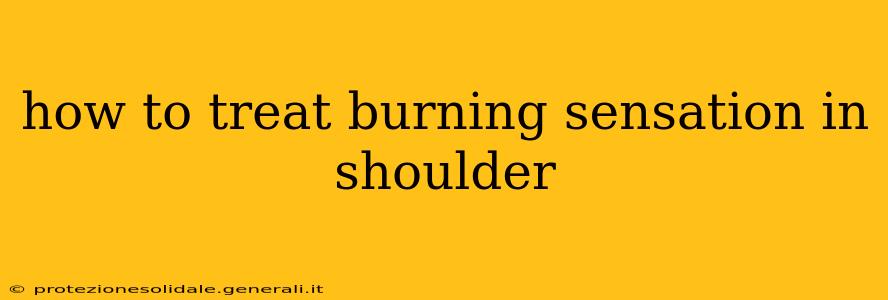A burning sensation in your shoulder, often described as shoulder burning pain, can be incredibly uncomfortable and debilitating. It can interfere with daily activities, sleep, and overall well-being. While the exact cause needs to be diagnosed by a medical professional, understanding the potential underlying issues and available treatment options is crucial for effective management. This guide explores various causes, home remedies, and medical interventions to help you address this persistent symptom.
What Causes a Burning Sensation in the Shoulder?
Pinpointing the source of shoulder burning pain is the first step towards effective treatment. Several conditions can contribute to this unpleasant feeling:
- Nerve Compression: Conditions like cervical radiculopathy (pinched nerve in the neck) or thoracic outlet syndrome (compression of nerves and blood vessels in the shoulder and neck) can cause radiating burning pain down the arm and into the shoulder.
- Bursitis: Inflammation of the bursae (fluid-filled sacs that cushion the shoulder joint) can result in sharp, burning pain. This is often aggravated by movement.
- Tendinitis: Inflammation of the tendons (which connect muscles to bones) in the shoulder, such as rotator cuff tendinitis, can lead to burning pain and stiffness.
- Arthritis: Conditions like osteoarthritis and rheumatoid arthritis can cause chronic pain, including a burning sensation, in the shoulder joint.
- Referred Pain: Pain originating from another area of the body, such as the heart, neck, or even the spine, can sometimes manifest as burning pain in the shoulder.
- Muscle Strain or Sprain: Overuse or injury to the shoulder muscles can cause inflammation and a burning sensation.
- Fibromyalgia: This chronic condition causes widespread musculoskeletal pain, including burning pain in various parts of the body, often the shoulders.
What are Home Remedies for Shoulder Burning Pain?
Before seeking medical attention, several home remedies might provide temporary relief:
- Rest: Avoid activities that aggravate the pain. Resting the shoulder allows the tissues to heal.
- Ice Packs: Applying ice packs for 15-20 minutes at a time, several times a day, can help reduce inflammation and pain. Remember to wrap the ice pack in a thin towel to protect your skin.
- Heat Therapy: In some cases, heat therapy can provide relief. Use a heating pad or warm compress for 15-20 minutes at a time. Experiment to see which works better for you – heat or ice.
- Over-the-Counter Pain Relievers: Nonsteroidal anti-inflammatory drugs (NSAIDs) like ibuprofen or naproxen can help reduce pain and inflammation. Always follow the recommended dosage.
- Gentle Stretching and Exercises: Once the initial inflammation subsides, gentle range-of-motion exercises can help improve flexibility and reduce stiffness. However, avoid any exercises that cause increased pain. Consult a physical therapist for guidance.
What are the Medical Treatments for Persistent Shoulder Burning Pain?
If home remedies fail to provide relief, or if the pain is severe, persistent, or accompanied by other symptoms, it's crucial to seek medical attention. Your doctor might recommend:
- Physical Therapy: A physical therapist can design a personalized exercise program to strengthen the shoulder muscles, improve flexibility, and restore function.
- Corticosteroid Injections: These injections can help reduce inflammation in the shoulder joint.
- Medications: Your doctor might prescribe stronger pain relievers or other medications to manage underlying conditions.
- Surgery: In rare cases, surgery may be necessary to repair damaged tendons, remove bone spurs, or address other structural problems.
How Can I Prevent Future Shoulder Burning Pain?
Preventing future episodes of shoulder burning pain involves adopting healthy habits and practices:
- Maintain Good Posture: Proper posture helps reduce strain on the shoulder muscles and joints.
- Ergonomic Workplace Setup: Ensure your workspace is ergonomically designed to minimize strain on your shoulders and neck.
- Regular Exercise: Regular exercise helps strengthen the muscles surrounding the shoulder joint and improve overall flexibility.
- Warm-up Before Activities: Always warm up before engaging in any physical activity that involves the shoulder joint.
- Avoid Overuse: Avoid repetitive movements or activities that may strain the shoulder.
What are Other Symptoms that Accompany Shoulder Burning Pain?
H2: What other symptoms might accompany a burning sensation in my shoulder?
This is a crucial question, as accompanying symptoms can help pinpoint the underlying cause. These might include:
- Numbness or Tingling: This often suggests nerve compression.
- Weakness: Difficulty lifting or using your arm.
- Limited Range of Motion: Inability to fully move your shoulder in various directions.
- Swelling: Visible swelling around the shoulder joint.
- Redness: Redness of the skin around the shoulder.
- Stiffness: Difficulty moving your shoulder freely.
- Pain that Radiates Down the Arm: This is common with nerve problems.
If you experience any of these symptoms along with a burning sensation, consult a doctor immediately.
When Should I See a Doctor About Shoulder Burning Pain?
You should seek medical attention if:
- The pain is severe or persistent.
- Home remedies don't provide relief.
- The pain is accompanied by other symptoms, such as numbness, weakness, swelling, or fever.
- The pain interferes with your daily activities or sleep.
Remember, this information is for general knowledge and should not be considered medical advice. Always consult a healthcare professional for accurate diagnosis and treatment of any medical condition. They can perform a thorough examination, order necessary tests, and develop a tailored treatment plan to address your specific situation and alleviate your shoulder burning pain effectively.
